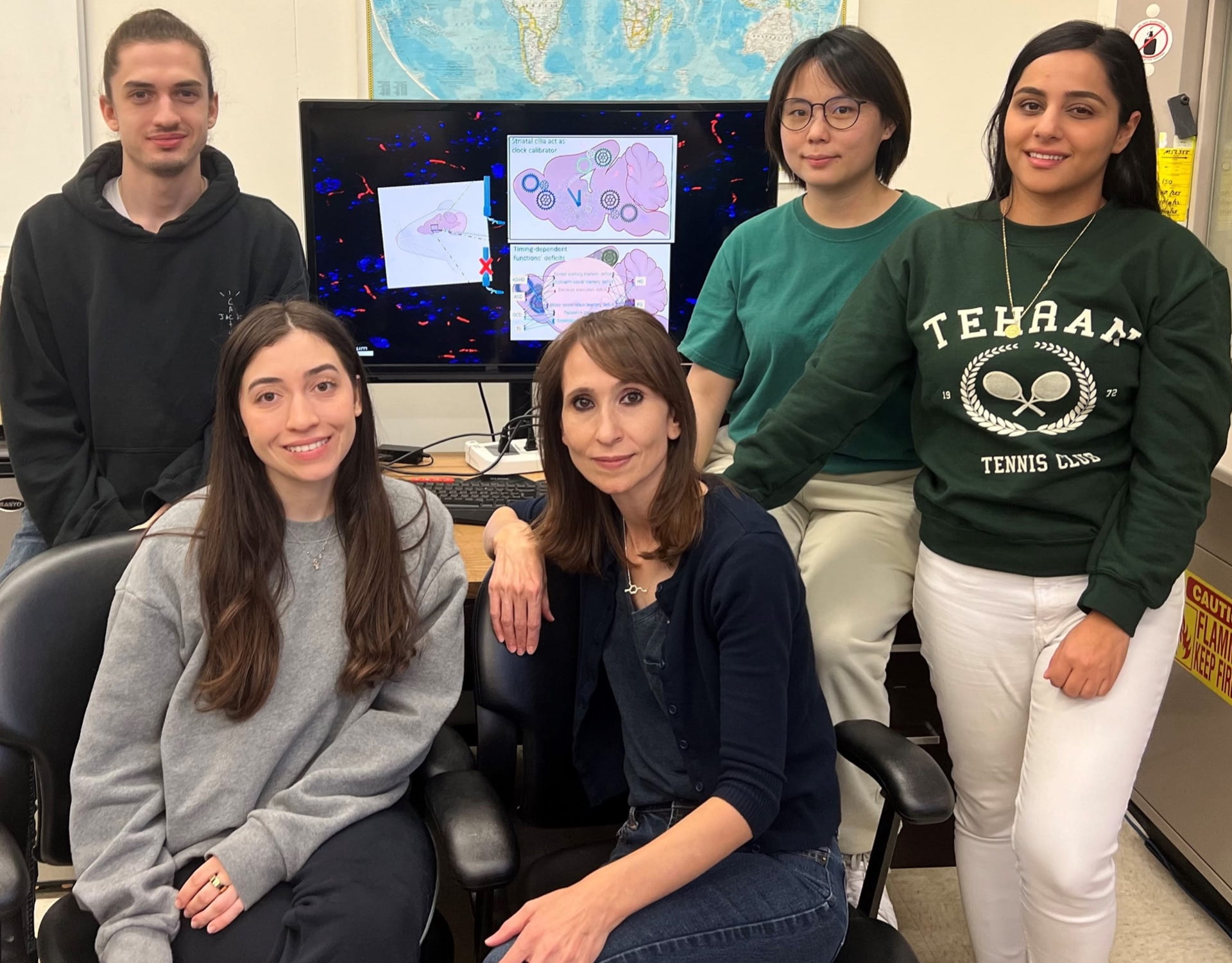UCI researchers discover crucial role of brain’s striatum cilia in time perception
Results reveal possible new therapeutic targets for mental and neurological disorders

Irvine, Calif., Nov. 30, 2022 — Researchers at the University of California, Irvine have discovered that removal of cilia from the brain’s striatum region impaired time perception and judgment, revealing possible new therapeutic targets for mental and neurological conditions including schizophrenia, Parkinson’s and Huntington’s diseases, autism spectrum disorder, and Tourette syndrome.
The striatum processes and integrates new environmental sensory information and coordinates the time sequence of motor responses. A common feature across specific mental and neurological disorders is a profound decline in patients’ ability to adjust to variations in their surroundings and accurately estimate the timing and termination of voluntary actions.
The study, recently published online in the journal Molecular Neurobiology, uncovered the first evidence of the important role cilia play in timing-dependent dysfunction.
“Our findings may revolutionize our understanding of brain functions and mental disorders in the context of the critical task performed by these previously unappreciated organelles in the brain’s ‘central clock’ function,” said Amal Alachkar, Ph.D., corresponding author and professor of teaching in UCI’s Department of Pharmaceutical Sciences. “Our results may open new avenues for effective intervention through cilia-targeted therapies for treatment.”
The striatum is part of the brain’s circuitry that performs central clock processes, essential in controlling executive functions such as motor coordination, learning, planning and decision-making, as well as working memory and attention. Cilia protrude from the brain cell surfaces like antennae, working as a signaling hub that senses and transmits signals to generate appropriate reactions.
To examine their physiological role, the researchers removed cilia from the striatum in mice using conditional gene manipulation technology. These rodents were not able to learn new motor tasks, showed repetitive motor behavior and exhibited delays in decision-making. They were also deficient in rapidly recalling information about their location and orientation in space and in their ability to filter irrelevant environmental sensory information. However, the mice maintained habitual or already learned motor skills and long-term memories.
“Successful performance of working memory, attention, decision-making and executive function requires accurate and precise timing judgment, usually within a millisecond to a minute,” Alachkar said. “When that capacity is impaired, it means losing the ability to quickly adjust behavior in response to changes in external stimuli and failing to sustain appropriate, goal-oriented motor responses. Our ongoing work is aimed at understanding the mechanisms by which cilia regulate time perception and developing targeted therapies to improve behavioral deficits.”
Team members also included pharmaceutical sciences graduate students Wedad Alhassen, Sammy Alhassen, Kiki Jiaqi Chen and Roudabeh Vakil Monfared.
This work was funded, in part, by the National Institutes of Health under award numbers R01-HL1473-02S1 and 1F31MH126565-01A1.
About UCI’s Brilliant Future campaign: Publicly launched on Oct. 4, 2019, the Brilliant Future campaign aims to raise awareness and support for UCI. By engaging 75,000 alumni and garnering $2 billion in philanthropic investment, UCI seeks to reach new heights of excellence in student success, health and wellness, research and more. The School of Pharmacy & Pharmaceutical Sciences plays a vital role in the success of the campaign. Learn more by visiting https://brilliantfuture.uci.edu/school-of-pharmacy-and-pharmaceutical-sciences.
About the University of California, Irvine: Founded in 1965, UCI is a member of the prestigious Association of American Universities and is ranked among the nation’s top 10 public universities by U.S. News & World Report. The campus has produced five Nobel laureates and is known for its academic achievement, premier research, innovation and anteater mascot. Led by Chancellor Howard Gillman, UCI has more than 36,000 students and offers 224 degree programs. It’s located in one of the world’s safest and most economically vibrant communities and is Orange County’s second-largest employer, contributing $7 billion annually to the local economy and $8 billion statewide. For more on UCI, visit www.uci.edu.
Media access: Radio programs/stations may, for a fee, use an on-campus ISDN line to interview UCI faculty and experts, subject to availability and university approval. For more UCI news, visit news.uci.edu. Additional resources for journalists may be found at communications.uci.edu/for-journalists.


